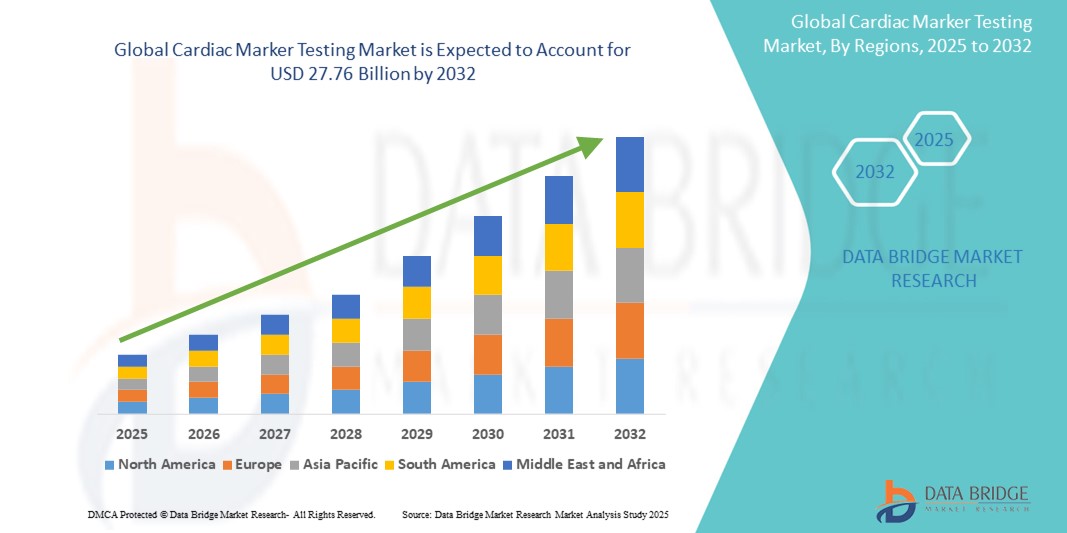Global Cardiac Marker Testing Market
市场规模(十亿美元)
CAGR :
% 
 USD
13.83 Billion
USD
27.76 Billion
2024
2032
USD
13.83 Billion
USD
27.76 Billion
2024
2032
| 2025 –2032 | |
| USD 13.83 Billion | |
| USD 27.76 Billion | |
|
|
|
|
全球心臟標記檢測市場細分,按類型(肌鈣蛋白 I 和 T、肌酸激酶同工酶 (CK-MB)、腦鈉肽 (Bnp 或 Nt-Probnp)、肌紅蛋白、高敏 C 反應蛋白 (hs-CRP)和其他生物標記)、產品(儀器、化學發光、免疫螢光、ELISA、免疫層析和試劑和試劑盒)、疾病(心肌梗塞、充血性心臟衰竭急性冠狀動脈綜合徵、動脈粥樣硬化和缺血)、檢測類型(實驗室檢測、學術機構和即時診斷檢測)- 行業趨勢和預測到 2032 年
心臟標記檢測市場規模
- 2024 年全球心臟標記檢測市場規模為138.3 億美元 ,預計 到 2032 年將達到 277.6 億美元,預測期內 複合年增長率為 9.10%。
- 心臟標記檢測市場的成長很大程度上是由於心肌梗塞、急性冠狀動脈綜合症和充血性心臟衰竭等心血管疾病(CVD)的盛行率不斷上升,這些疾病需要準確、及時的診斷
- 此外,對使用者友善藥物輸送系統的需求不斷增長,加上重症監護和緊急情況下對有效和安全的藥物管理的需求,使得心臟標記檢測成為患者和醫療保健專業人員的必備工具。個人化醫療和生物標記引導療法的轉變,以及醫療支出的增加和基礎設施的改善,也是促成因素
心臟標記檢測市場分析
- 心臟標記檢測包括測量心肌受損時釋放的血液中特定蛋白質的含量。這些檢查有助於診斷或排除心臟病等病症,並監測心臟健康
- 心臟標記檢測市場正在經歷顯著增長,這得益於需要頻繁注射的慢性疾病的日益流行、預充式註射器中可用的生物製劑和生物仿製藥數量的不斷增加,以及緊急情況下對用戶友好的藥物輸送的需求不斷增長
- 北美在心臟標記檢測市場佔據主導地位,2024 年的收入份額最大,為 41.2%,這歸功於其先進的醫療基礎設施、先進醫療設備的高採用率以及領先的製藥和醫療設備製造商的強大影響力
- 預計亞太地區將成為預測期內心臟標記檢測市場成長最快的地區,這得益於該地區對自我保健和先進診斷服務的日益增長的傾向,以及政府推動醫療現代化的舉措
- 試劑和試劑盒在心臟標記檢測市場佔據主導地位,2024 年的市佔率為 65.2%,這得益於它們在跨不同檢測平台檢測和量化心臟生物標記方面發揮的關鍵作用
報告範圍和心臟標記檢測市場細分
|
屬性 |
心臟標記檢測關鍵市場洞察 |
|
涵蓋的領域 |
|
|
覆蓋國家 |
北美洲
歐洲
亞太
中東和非洲
南美洲
|
|
主要市場參與者 |
|
|
市場機會 |
|
|
加值資料資訊集 |
除了對市場價值、成長率、細分、地理覆蓋範圍和主要參與者等市場情景的洞察之外,Data Bridge Market Research 策劃的市場報告還包括深入的專家分析、定價分析、品牌份額分析、消費者調查、人口統計分析、供應鏈分析、價值鏈分析、原材料/消耗品概述、供應商選擇標準、PESTLE 分析、波特分析和監管框架。 |
心臟標記檢測市場趨勢
“透過心臟標記檢測中的人工智慧和智慧整合提高精度和用戶體驗”
- 全球心臟標記檢測市場中一個重要且快速加速的趨勢是人工智慧 (AI) 的深度融合以及旨在提升用戶體驗的智慧功能的融入。這種尖端技術的融合從根本上改變了心臟生物標記的分析和管理方式,提供了前所未有的便利性和控制力
- 例如,越來越多的複雜心臟標記檢測設備配備了先進的連接選項,如藍牙和 Wi-Fi。這些技術實現了無縫數據傳輸,使患者能夠追蹤其生物標記水平,並使醫療保健專業人員能夠遠端監測趨勢和治療計劃的依從性
- 心臟標記檢測平台中的人工智慧整合可增強多種功能,例如提高生物標記分析的準確性、根據個別患者資料提供個人化診斷見解的潛力,以及根據綜合使用數據產生更聰明的警報
- 這種朝向更智慧、直覺和互聯的心臟標記檢測系統的逐步轉變從根本上重塑了人們對住院和家庭醫療保健環境的期望。因此,領先的公司正在積極開發支援人工智慧的解決方案,這些解決方案提供自動調整以實現精確測量、即時數據追蹤和高度用戶友好的介面等功能
- 醫院和家庭醫療保健領域對提供無縫 AI 和語音控制整合(或類似智慧功能)的心臟標記檢測解決方案的需求正在快速增長。這種激增是由於患者和臨床醫生對便利性、準確性和全面的智慧健康功能的強烈集體優先考慮
心臟標記檢測市場動態
司機
“心血管疾病負擔加重以及對便捷診斷的偏好導致需求不斷增長”
- 全球人口不斷增長,心血管疾病 (CVD) 的盛行率不斷上升,加上對便捷、可獲得的診斷幹預措施的需求不斷增加,是心臟標記檢測需求增加的重要驅動力。由於心血管疾病仍然是全球死亡的主要原因,因此對心肌梗塞、心臟衰竭和急性冠狀動脈綜合徵等疾病的準確及時診斷工具的需求至關重要
- 例如,2023年10月,邁瑞宣布推出新的高敏肌鈣蛋白I和NT-proBNP心臟生物標記。這項進步旨在改善心血管疾病的診斷和管理,推動心臟標記檢測市場的成長
- 此外,患者友善診斷平台日益複雜,特別是即時診斷(POCT)解決方案,需要精確且易於使用的管理,加上對互聯患者監測系統的需求,使得心臟標記測試成為現代醫療保健方案的一個組成部分。這些系統與數位健康平台無縫集成,實現遠端監控和數據共享
- 對於有慢性心血管疾病風險或患有慢性心血管疾病的個人來說,方便進行檢測、遠端監控能力以及透過整合智慧系統管理複雜診斷方案的能力是推動醫院和家庭醫療保健領域採用心臟標記檢測的關鍵因素。改善患者體驗的趨勢和日益普及的用戶友好型測試選項進一步促進了市場的成長
克制/挑戰
“對測試複雜性、標準化和高實施成本的擔憂”
- 人們對一些先進的心臟標記檢測平台的複雜性以及用戶錯誤或誤解結果的可能性的擔憂對更廣泛的市場滲透構成了重大挑戰。由於這些診斷系統整合了更多的功能和技術,如果沒有明確的說明、標準化的協議和適當的培訓,它們很容易被錯誤使用,從而引起醫療專業人員和患者對其診斷結果可靠性的擔憂
- 例如,有傳聞稱,臨床醫生難以應對多步驟的檢測流程,或不同檢測方法和實驗室之間結果的差異,這使得一些人猶豫是否要完全採用最先進的、缺乏強大標準化的心臟標誌物檢測解決方案
- 此外,一些先進的心臟標記檢測系統,特別是那些採用尖端技術或自動化平台的系統,其初始成本相對較高,可能會成為資源受限的醫療保健系統或沒有足夠保險覆蓋的患者採用該系統的障礙
- 雖然由於技術進步和競爭加劇,價格正在逐漸下降,但先進心臟標記檢測技術的溢價仍然可能阻礙其廣泛採用,特別是對於那些不認為其提供的最先進功能迫切需要的地區或醫療保健提供者而言
心臟標記檢測市場範圍
市場根據類型、產品、疾病和測試類型進行細分。
- 按類型
根據類型,心臟標記檢測市場細分為肌鈣蛋白 I 和 T、肌酸激酶同工酶 (CK-MB)、腦鈉肽 (BNP 或 NT-proBNP)、肌紅蛋白、高敏感性 C 反應蛋白 (hs-CRP) 和其他生物標記。肌鈣蛋白 I 和 T 因其在診斷急性心肌梗塞(心臟病發作)方面無與倫比的準確性和黃金標準地位,在 2024 年佔據了 41.7% 的最大市場份額。
腦鈉肽 (BNP 或 NT-proBNP) 領域預計將出現最快的成長率,這得益於其在診斷心臟衰竭和心血管疾病風險分層方面的關鍵作用。
- 按產品
根據產品,心臟標記檢測市場分為化學發光儀器、免疫螢光儀器、ELISA 儀器、免疫層析儀器以及試劑和試劑盒。試劑和試劑盒部分在 2024 年佔據了最大的市場收入份額,為 65.2%。它們的廣泛應用歸因於它們在跨多個測試平台檢測和量化心臟生物標記方面發揮的關鍵作用,確保了診斷結果的高靈敏度和特異性。
由於心血管疾病發病率的不斷上升、使用方便以及檢測準確性的提高,導致對心臟標記檢測的需求增加,預計試劑和試劑盒部門在預測期內的收入複合年增長率將很高。
- 按疾病
根據疾病,心臟標記檢測市場分為心肌梗塞、充血性心臟衰竭、急性冠狀動脈症候群、動脈粥狀硬化和缺血。急性冠狀動脈綜合症細分市場佔據了 2024 年最大的市場收入份額,這得益於關鍵心臟生物標記(尤其是肌鈣蛋白)在診斷中的廣泛應用。
預計心肌梗塞領域在預測期內將以複合年增長率成長,這得益於對該疾病研究的重視程度不斷提高
- 按測試類型
根據檢測類型,心臟標記檢測市場分為實驗室檢測、學術機構和即時檢測。實驗室檢測部門在 2024 年佔據了最大的市場收入份額,因為它們具有全面的診斷能力和完善的心臟標記檢測基礎設施,可靠性高、準確性高。
由於靈敏且用戶友好的即時檢測肌鈣蛋白檢測日益普及,且需要立即獲得結果以便及時做出治療決策(尤其是在緊急情況下),預計即時檢測領域將快速增長
心臟標記檢測市場區域分析
- 北美在心臟標記檢測市場佔據主導地位,2024 年其收入份額最大,為 41.2%,這得益於對先進診斷護理的需求不斷增長以及先進醫療技術的高採用率
- 該地區的消費者和醫療保健提供者高度重視綜合醫療保健系統中心臟標記檢測為患者安全提供的有效性和先進功能,特別是對心臟狀況的準確診斷和監測。例如,在美國,心血管疾病的盛行率很高,2022 年每 5 例死亡中就有 1 例是心臟病,凸顯了這些檢測的迫切需求
- 高昂的醫療支出、技術先進的醫療社區、優惠的報銷政策以及對心臟病早期診斷和管理的日益重視,進一步支持了這種廣泛應用,使心臟標誌物檢測成為各種醫療環境中受歡迎的診斷方法
心臟標記檢測市場區域分析
美國心臟標記檢測市場洞察
受先進醫療技術的迅速普及和患者護理不斷擴大的推動,美國心臟標記檢測市場在 2024 年佔據北美最大的收入份額,為 30.4%。醫療保健和緊急醫療服務越來越重視透過智慧、整合的診斷解決方案來提高病患安全性和治療效果。人們對便利診斷技術的日益偏好,加上對先進監測和便攜式設備的強勁需求,進一步推動了心臟標記檢測行業的發展。此外,複雜軟體和連接功能的日益整合也極大地促進了市場的擴張。
歐洲心臟標記檢測市場洞察
預計歐洲心臟標記檢測市場將從 2025 年到 2032 年以大幅複合年增長率擴張,這主要受到嚴格的醫療保健法規以及醫院和家庭護理環境對快速準確診斷日益增長的需求的推動。人口老化的增加,加上對使用者友善的慢性病醫療設備的需求,促進了先進心臟標記檢測技術的應用。歐洲醫療保健提供者也被這些診斷設備提供的增強的患者治療效果和安全功能所吸引。該地區的醫院重症監護室、急診室和家庭醫療保健應用正在經歷顯著增長,心臟標記檢測被納入到新的醫療保健設施和現有醫療設施的升級中。
英國心臟標記檢測市場洞察
英國心臟標記檢測市場預計在預測期內將以顯著的複合年增長率增長,這主要得益於家庭醫療保健實踐的不斷升級以及對提高患者安全性和治療效果的渴望。此外,對慢性病管理的關注以及對便捷藥物輸送解決方案的需求正在鼓勵醫院和家庭護理提供者選擇先進的心臟標記檢測技術。英國對醫療保健技術進步的擁抱,加上其強大的醫療保健基礎設施,預計將繼續刺激市場成長
德國心臟標記檢測市場洞察
預計德國心臟標記檢測市場將在 2025 年至 2034 年間以相當大的複合年增長率擴張,這得益於人們自我保健意識的提高以及對技術先進、以患者為中心的解決方案的需求。德國發達的醫療保健基礎設施,加上對創新和病人安全的重視,促進了先進心臟標記檢測設備的採用,尤其是在醫院和專科護理環境中。心臟標記檢測與患者監測系統的整合也變得越來越普遍,人們強烈傾向於符合當地醫療保健標準的安全、可靠的解決方案
亞太心臟標記檢測市場洞察
受中國、日本和印度等國家醫療保健投資增加、可支配收入增加和技術進步的推動,亞太地區心臟標記檢測市場預計在 2025 年至 2032 年期間以 11.9% 的最快複合年增長率增長。在政府推動醫療現代化措施的支持下,該地區對自我照護和先進診斷服務的日益傾向正在推動先進心臟標記檢測設備的採用。此外,隨著亞太地區逐漸成為醫療器材零件和系統的製造中心,某些心臟標記檢測技術的經濟性和可近性正在擴展到更廣泛的醫療保健領域
日本心臟標記檢測市場洞察
由於日本的高科技文化、人口快速老化以及對便利醫療保健解決方案的需求,日本心臟標記檢測市場正在獲得發展動力。日本市場非常重視患者的安全和舒適度,老年患者數量的增加以及需要精確診斷的複雜醫療病例的增加推動了先進心臟標記檢測設備的採用。心臟標記測試與其他醫療物聯網設備和監測系統的整合正在推動成長。此外,日本人口老化可能會刺激醫院和家庭護理領域對更容易使用、更可靠的診斷解決方案的需求。
中國心臟標記檢測市場洞察
2024 年,中國心臟標記檢測市場佔據亞太地區最大的市場收入份額,複合年增長率為 15.9%,這歸因於中國不斷擴大的醫療保健基礎設施、快速的城市化以及醫療領域的高技術採用率。中國是最大的醫療器材市場之一,先進的心臟標記檢測設備在醫院、急診室和專科診所越來越受歡迎。推動慢性病藥物的自我管理、價格實惠的醫療器材選擇的可用性以及強大的國內製造商是推動中國市場發展的關鍵因素。
心臟標記檢測市場份額
心臟標記檢測產業主要由知名公司主導,包括:
- F. Hoffmann-La Roche Ltd(瑞士)
- 雅培(美國)
- 西門子醫療股份公司(德國)
- 丹納赫公司(美國)
- 生物梅里埃(法國)
- QuidelOrtho Corporation(美國)
- 朗道實驗室有限公司(英國)
- BG 醫藥(美國)
- Bhat Bio-tech India Private Limited(印度)
- 默克集團(德國)
- 珀金埃爾默(美國)
- QIAGEN(荷蘭)
- 安捷倫科技公司(美國)
- 布魯克(美國)
- Epigenomics AG(德國)
- MESO SCALE DIAGNOSTICS, LLC. (我們)
- EKF Diagnostics Holdings plc. (英國)
- Nexus-Dx(美國)
- LifeSign有限責任公司(我們)
- DIALAB GmbH(奧地利)
- 貝克曼庫爾特公司(美國)
全球心臟標記檢測市場的最新發展
- 2023 年 11 月,雅培實驗室的 i-STAT TBI 血漿測試獲得 FDA 批准,該測試包括先進的心臟標記檢測功能。這擴大了便攜式即時診斷設備在醫院和現場環境中的快速心臟和神經系統診斷的應用
- 2024 年 6 月,西門子醫療在 Atellica 解決方案平台上引入 NT-proBNPII (PBNPII) 檢測,擴展了其心臟檢測產品組合。此項發展旨在增強心臟病的診斷能力
- 2024 年 3 月,Polymedco 的快速肌鈣蛋白檢測(作為其 Pathfast 生物標記分析儀的一個單元)獲得了 FDA 的 510(k) 批准。這種經 FDA 批准的生物標記可識別心肌肌鈣蛋白 I 的存在,這是心肌梗塞的關鍵指標
- 2023年10月,全球醫療器材及解決方案供應商邁瑞醫療在全球推出兩種新的心臟生物標記:高敏肌鈣蛋白I(hs-cTnI)和NT-proBNP。這些新增產品增強了邁瑞在心血管疾病診斷和管理方面的多樣化產品組合
SKU-
Get online access to the report on the World's First Market Intelligence Cloud
- Interactive Data Analysis Dashboard
- Company Analysis Dashboard for high growth potential opportunities
- Research Analyst Access for customization & queries
- Competitor Analysis with Interactive dashboard
- Latest News, Updates & Trend analysis
- Harness the Power of Benchmark Analysis for Comprehensive Competitor Tracking
研究方法
数据收集和基准年分析是使用具有大样本量的数据收集模块完成的。该阶段包括通过各种来源和策略获取市场信息或相关数据。它包括提前检查和规划从过去获得的所有数据。它同样包括检查不同信息源中出现的信息不一致。使用市场统计和连贯模型分析和估计市场数据。此外,市场份额分析和关键趋势分析是市场报告中的主要成功因素。要了解更多信息,请请求分析师致电或下拉您的询问。
DBMR 研究团队使用的关键研究方法是数据三角测量,其中包括数据挖掘、数据变量对市场影响的分析和主要(行业专家)验证。数据模型包括供应商定位网格、市场时间线分析、市场概览和指南、公司定位网格、专利分析、定价分析、公司市场份额分析、测量标准、全球与区域和供应商份额分析。要了解有关研究方法的更多信息,请向我们的行业专家咨询。
可定制
Data Bridge Market Research 是高级形成性研究领域的领导者。我们为向现有和新客户提供符合其目标的数据和分析而感到自豪。报告可定制,包括目标品牌的价格趋势分析、了解其他国家的市场(索取国家列表)、临床试验结果数据、文献综述、翻新市场和产品基础分析。目标竞争对手的市场分析可以从基于技术的分析到市场组合策略进行分析。我们可以按照您所需的格式和数据样式添加您需要的任意数量的竞争对手数据。我们的分析师团队还可以为您提供原始 Excel 文件数据透视表(事实手册)中的数据,或者可以帮助您根据报告中的数据集创建演示文稿。














